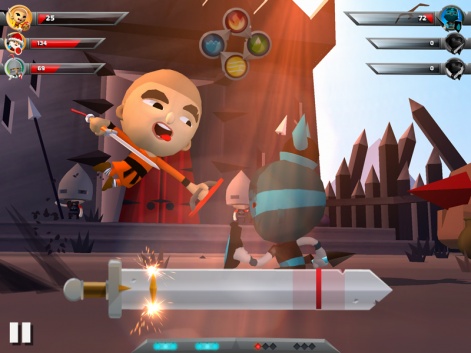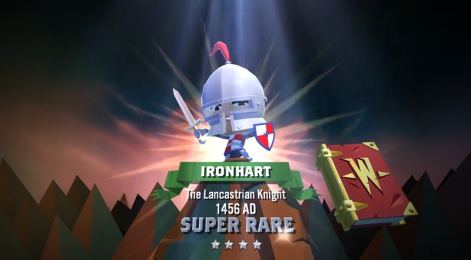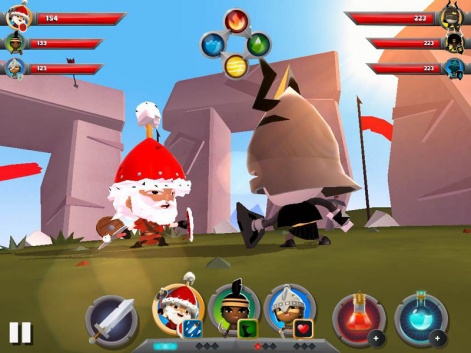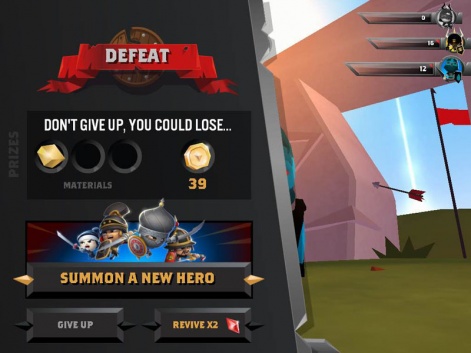Welcome to the return of The In-App Purchase Inspector - our regular look at free-to-play games from the consumer's perspective.
In each installment, we'll be looking at the incentives or pressure applied to make in-app purchases, their perceived value, the expansion offered by IAPs and the overall value of the experience.
The end goal will be to see whether the game makes a good enough case for us to part with our cash, or whether players are content - or engaged enough - to 'freeload'.
This time, we'll be taking a look at Mind Candy's turn-based history historical battler World of Warriors.
Warriors, come out to play
While World of Warriors has a more traditionally 'hardcore' concept than Mind Candy's previous output, its art style is vibrant and welcoming as you'd expect from the company which brought us Moshi Monsters.
The game has you collecting a squad of historical warriors from different time periods and parts of the world to become an all-conquering force. Romans and Vikings fight alongside knights, samurai, and Turks - but even these steely-eyed killers are portrayed as cute and cuddly characters.
The gameplay mechanics are streamlined and easy to grasp, too. With a turn-based combat system which relies on the elemental strengths and weaknesses of each character class, there is some semblance of tactical play in choosing a line-up of warriors which plays to your strengths and exploits enemy weaknesses.

The fights themselves rely on little more than well-timed touch prompts and tagging your three warriors in and out of the battle whenever necessary.
And that, coupled with the charming character designs, makes this a free-to-play game with the potential to reach a wide audience.
The long war
So, it's got what it takes to hook players in, but how does World of Warriors engage them over the long term, keep them coming back for more, and - most importantly - give incentives for them to part with cash?
Mind Candy's approach to monetisation is a surprisingly classy.
Despite having impressive 3D graphics, the systems that drive World of Warriors are based on the old-fashioned, tried-and-tested ways of the collectible card game. The warriors you collect all have their own abilities, but are also ranked according to their rarity - from common through to super rare and legendary.
A rare warrior becomes a badge of honour, then - no doubt all the more significant once PvP mode rolls out, and an in-game status symbol worth paying real money for.
Shelling out for new warriors, much like buying card packs in a CCG, is a blind process. Fresh combatants can be bought for 10 wildstones a pop at the Door of Epics, which spits out a random new warrior in return for your shiny contribution.

These wildstones are the game's most valuable currency, and they're pretty hard to come by in standard play - World of Warriors isn't particularly generous in handing them out, so bolstering your crew quickly will likely cost you some dollars
Wildstones can be bought in 6 bundles: 2 for $1.99, 10 for $4.99, ranging up to 130 for $49.99 and 280 for $99.99.
Occasionally, there are time limited offers splashed across the game's welcome screen, too, with countdown timers giving the in-app purchase a sense of urgency. I bought 14 wildstones for $4.99 via one of these offers, a 40 percent bonus over the standard haul of 10.
There are other currencies to deal with as well. Blue Honor Stones are the game's soft currency, and are used to buy random materials at the temple's Honor Door. These materials can be combined to create consumable items in the foundry, which imbue your warriors with special abilities.
You can't buy Honor Stones using real money - nor would you want to, as they're of little value - but they are in fairly plentiful supply in standard play. Daily rewards offer 5 of the blue gems for every day you log in, culminating in a free wildstone on the sixth consecutive day.

The third currency is gold, a resource used primarily to fund the training and upgrading of your warriors. This, too, should be in quite healthy supply through the spoils of war alone, but you can also exchange wildstones in order to stock up on it.
And, to top it off, World of Warriors even has an energy system - a much argued about element in F2P games - offering you the chance to buy yourself more energy when your troops lack the stamina to fight.
However, in relatively casual play over a number of weeks, I have rarely been in a situation where I needed more energy. And even if you do, the wait timers aren't so lengthy as to feel like you're being cynically ground into a purchase.
The true cost of war
The main thing to point out in this context is that World of Warriors has the potential to nickel-and-dime the player far more than it actually does, and for that it deserves praise.
A game with three different currencies and an energy system has the potential to be exploitative, but World of Warriors is pretty straightforward and up-front about its monetisation.
Basically you spend money on wildstones, which in turn are randomly exchanged for new warriors at the exchange rate of 10 wildstones - or $4.99 - per character. For the majority of players, that'll be the only real money transaction taking place.
Personally, I've spend $10 on wildstones so far, and the two additional warriors that got me - along with the powerful Kris Kringle character awarded for playing over the festive period - has been plenty to make good progress.

Like any RPG, even the weakest warriors can be strengthened with the right training and ability add-ons - indeed, with enough grinding you can turn the weakest common warrior into a legendary warrior - but that process will take you a lot of time to complete.
This isn't a game which grinds pennies out of you to keep enjoying the same experience.
For anyone without that level of patience, it won't be long before you're left hankering to speed things up and buy new high level warriors to boost your line-up. And that itch, if it perseveres, could cost you a significant amount in IAP expenditure over the long term.
We're back to the CCG comparison, then - World of Warriors is a game which is quite possible to play and enjoy with a starter deck, but you'll get more out of it if you put down a little investment. Its transparency is to its credit - this isn't a game which grinds pennies out of you to keep enjoying the same experience over the duration, but instead offers in-app purchases which actually impact your game.
The only area in which World of Warriors' monetisation can feel a hard sell is when it comes to reviving after you lose a battle. It costs two wildstones to revive your warriors - worth $1.99 in real money - and even then the measly sliver of health with which it returns you to the battlefield is often not enough to claim a victory.

Sure, it's not too taxing to simply admit defeat and restart a battle - and, often, if you die it's an indication you should do some grinding to strengthen up - but reviving you with such a meagre bit of health seems unnecessarily harsh.
War's embers
To conclude, then, there's no pretending World of Warriors is the most in-depth or strategic mobile RPG.
But nor is it a braindead, pay-to-win slog. The squad-based battling feels just involving enough to be satisfying without alienating the more causal among its player base, and there are definite avenues for progression without spending a penny.
It's got undeniably high production values, to boot, and warriors who feel unique enough to justify the occasional in-app purchase.
Overall, Mind Candy's approach to monetisation is a surprisingly classy one, relying on a solid, satisfying framework to incentivise the player to spend money rather than resorting to overly cynical tactics.




















